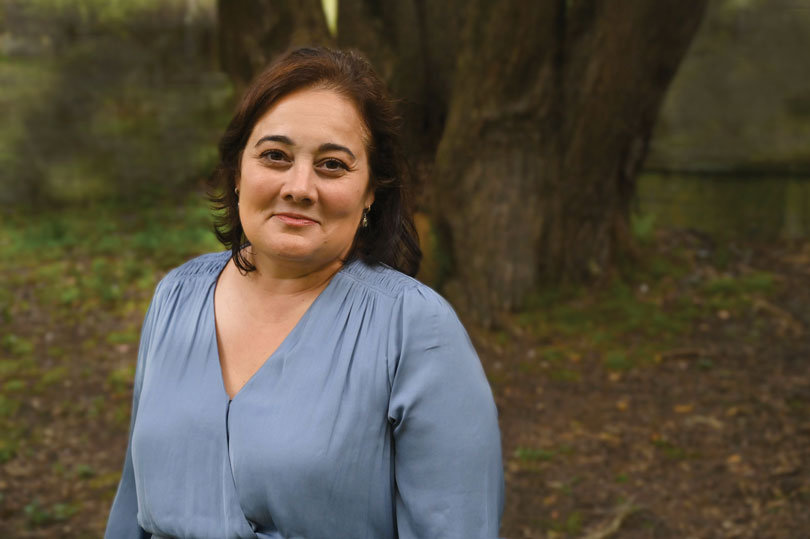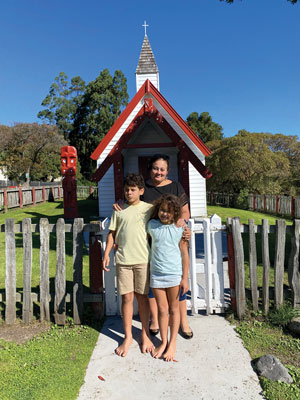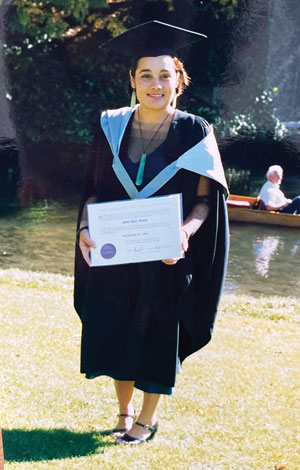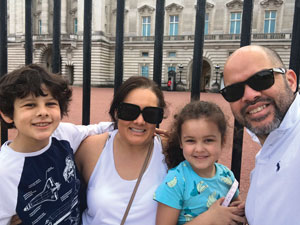Coming Home
Dec 19, 2022


Juliet Tainui-Hernandez (Ngāi Tahu – Ōnuku, Te Whakatōhea) returned home to Aotearoa in 2020 after two decades abroad to take up the role of Assistant Governor and General Manager of Transformation and People at Te Pūtea Matua (the Reserve Bank). Māmā of two, she is also a non-executive director on the board of Ngāi Tahu Holdings Corporation. Juliet talks to kaituhi Ila Couch about a life-changing career that has taken her around the world and back home again.
uliet says she has to call me back. The conversation that started at her house in Tāmaki continues from the back of a taxi heading to the airport. Still jet-lagged from her recent trip to Denmark visiting international reserve banks in Copenhagen, Juliet is grateful today’s trip is a short flight to Te Waipounamu.
As we talk through our screens, I tell her that it feels like we’re in a scene from a movie. I also confess I have no idea what an Assistant Governor/General Manager of Transformation and People does. “Actually, I recently had a
role change and it’s even longer now,” she says, smiling back at me via video chat.
“I’m Assistant Governor and General Manager of Transformation, Innovation, People and Culture.”
Juliet spent close to two decades abroad in Australia, Hong Kong and the UK working in international law firms. She is a qualified barrister and solicitor of the New Zealand High Court, a solicitor in the Supreme Court of New South Wales, Australia, and a solicitor in England and Wales. In 2020, she came home to take up not one, but two jobs.
The job with the long title, Assistant Governor/General Manager of Transformation, Innovation, People and Culture, is her position within the executive leadership team. The purpose of New Zealand’s central bank is Toitū te Ōhanga, Toitū te Oranga, or to promote the prosperity and wellbeing of New Zealanders and contribute to a sustainable and productive economy. For the past three years, Te Pūtea Matua has had a formal te ao Māori strategy, which is part of a holistic programme to modernise and transform the institution to be future-fit, stand tall and reflect New Zealand.
“I’m from Ōnuku where my father and tĪpuna grew up, so I feel very lucky to be connected to my whenua and having been around my wider whānau, hapū and iwi. I grew up around the marae and learnt my tikanga through tangihanga and mahinga kai.”
“The executive at Te Pūtea Matua is made up of the Governor, Deputy Governor, and seven Assistant Governors and, essentially, we run the Reserve Bank. Each of us also has a general management job where we are responsible for overseeing a number of functional areas. I have Transformation and Innovation, Enterprise Delivery, People and Capability, and Diversity, Inclusion and Wellbeing. The transformation and innovation department is future-focused and looks at what and how the bank needs to modernise, to remain resilient and to embrace a world of accelerating change, as we become ever more virtual and connected, increasingly digitised and data-led, and with broader stakeholder expectations around ESG sustainability.

Juliet with her tamariki Oscar and Paloma outside the wharekarakia at Ōnuku;
right: A young Juliet graduating from the University of Canterbury.
The second role as a director with NTHC solidified the family’s return to Aotearoa. “We had been thinking about coming back for a while,” says Juliet who met her husband, Javier Hernandez, in London where their two tamariki, Oscar Poutini (11) and Paloma Pounamu (8), were born. “When my dad said there would be an opportunity coming up for two new directors on Ngāi Tahu Holdings, I said I would put my hat in the ring for one of those, and if it came through, I would come home.”
As a non-executive director Juliet has a governance role that looks at how best to protect and continue growing pūtea from Te Kerēme for this generation and the next – mō tātou, ā, mō kā uri ā muri ake nei – for us and our children after us. Not only did this role bring her home, but it has also brought her career full circle. The first job she had for Ngāi Tahu was while studying for a double degree at Te Whare Wānanga o Waitaha (University of Canterbury).
“As a student studying law, I got to work with the iwi during Te Kerēme negotiations with the Crown. I undertook research projects and I also proofread the [Ngāi Tahu] Settlement, which looking back was a huge privilege.”
The daughter of Rik Tainui (Te Rūnanga Representative and Chair for Ōnuku) and Jillian Scammell, Juliet is a self-described country girl from Banks Peninsula. “I’m from Ōnuku where my father and tīpuna grew up, so I feel very lucky to be connected to my whenua and having been around my wider whānau, hapū and iwi. I grew up around the marae and learnt my tikanga through tangihanga and mahinga kai.”
Juliet recalls her late uncle, Pere Tainui, taking the lead when it came to tackling the long list of mahi that needed to be done at Ōnuku. “Pere was instrumental in the rebuild of our beautiful wharenui at Ōnuku,” she says. “Dad, as the younger brother, would stay back a bit but Pere knew he had some helpful skills, so over time he engaged him in fundraising efforts for the rebuild of the wharekai, sorting out the water at the creek, working on how to get Takapūneke back, and figuring out how to get the council to shift the sewage plant going into the sea there at our wāhi tapu.”
Juliet says she understood from an early age how important education was to her family. Her grandmother, Bernice Tainui (née Morgan, of Whakatōhea) supported the idea of sending Juliet to Christchurch where she spent three years boarding at Te Waipounamu Māori Girls’ College until its closure in 1990. “My grandfather, John Tainui, died when he was in his thirties and my nan was left to raise seven children when the baby of the family passed away a few days after his death.
The community raised funds for the family and a chunk of that money was spent sending my dad to school in Christchurch. Education has always been important to my whānau.”
As a teenager, Juliet had ambitions to travel overseas and a desire to experience other cultures. With a tourism career in mind, she enrolled at Christchurch Polytechnic to study Japanese. Her dad intervened, insisting she enroll at the University of Canterbury. Thanks to his foresight, Juliet broadened the scope of her studies, leading to an unexpected interest in law.
“Initially, I intended to focus on the Japanese language programme. I took te reo Māori, computer science, and law as my other subjects, but after the first year, I changed tack and decided on a double degree: Bachelor of Laws and Bachelor of Arts with a major in Māori Studies and History.”
 During those early years, Juliet forged strong friendships with the small group of Māori studying law. In 1993, the rōpū founded Te Pūtairiki, the Māori Law Students’ Association, and lobbied successfully for their own study room. “There weren’t very many Māori in law school in Canterbury so it really brought us together.” It was a place to debrief, to kōrero about Te Tiriti and public law, and it also gave us an immediate study group and common room to hang out in and support each other. It was a godsend, to be honest.”
During those early years, Juliet forged strong friendships with the small group of Māori studying law. In 1993, the rōpū founded Te Pūtairiki, the Māori Law Students’ Association, and lobbied successfully for their own study room. “There weren’t very many Māori in law school in Canterbury so it really brought us together.” It was a place to debrief, to kōrero about Te Tiriti and public law, and it also gave us an immediate study group and common room to hang out in and support each other. It was a godsend, to be honest.”
As positive as that experience was, the rōpū was unprepared for the negative reactions of some law students at the time, which ranged from complaints about a separate space for Māori, an unfair quota system for Māori students, and at worst, racial slurs posted over the sign ‘Te Pūtairiki’ that hung above the common room door.
“The backlash in many ways was as a result of an undeveloped understanding of equity, the history of New Zealand, and the position of Māori in Aotearoa,” says Juliet. “There were a lot of law students from private schools, with much more affluent backgrounds, whose parents had bought them houses, or paid for them to be in halls of residence, who could really enjoy university life and all it has to offer. I worked through university doing all sorts of jobs. It’s not that our families didn’t care in the same way, they just weren’t able to provide.”
One of the many part-time jobs Juliet had while studying, was on a research project for Ngāi Tahu. This evolved into a part-time role alongside her studies, supporting the strategy and legal team during Settlement negotiations of Te Kerēme with the Crown. The experience gave her the chance to work alongside respected kaumātua, Ngāi Tahu legal and financial advisers, and the privilege of building relationships with people who had a hand in shaping history. “Even when the mahi was administration or making cups of tea, as a student, it was pretty awesome to be honest.”
Building on her history-making mahi, Juliet’s first full-time job as a law clerk took her to Pōneke. With law firm Bell Gully, she continued working on the Ngāi Tahu claim as well as the Fisheries Deed of Settlement. The case for the Māori Fisheries Settlement was made in London at the Privy Council and, as Junior Counsel, Juliet went along.
Juliet’s mahi eventually took her to Sydney, but after a year, she decided on a working holiday in the UK. The move accelerated her international legal career working for large commercial multi-jurisdiction law firms as she managed cross-border issues involving professional conduct, regulatory matters, conflicts, money laundering, bribery and corruption, terrorist financing, and economic and trade sanctions.
“I took my first role in this area, just by chance, in one of the biggest law firms in the world. The job was in conflicts resolution and involved assessing all new business coming into the firm from any one of its 30 offices around the world, including the UK, Europe, Middle East, Asia, and the United States.
One of the many part-time jobs Juliet had while studying, was on a research project for Ngāi Tahu. This evolved into a part-time role alongside her studies supporting the strategy and legal team during settlement negotiations of Te Kerēme with the Crown. The experience gave her the chance to work alongside respected kaumātua, Ngāi Tahu legal and financial advisers and the privilege of building relationships with people who had a hand in shaping history.
Juliet was only in the UK for a year before being sent to Hong Kong on secondment for 12 months to take on the role of Head of Risk and Compliance, Asia. She describes the job as being in the right place at the right time. “I found the work really fascinating.
I got to implement regulatory change across the firm following the advent of brand anti-money laundering law and regulations; run training sessions for lawyers and staff in different countries; and I had to think about ways to adapt the central approach to balance outcomes for cultures and practices that didn’t quite gel with a UK and EU regulatory approach nor western ways of working.”
What started as a two-year working holiday extended to 19 years abroad. During that time, Juliet worked for five large international law firms, ultimately advancing to a management role with one of the biggest firms in the world. That firm was created through the combination of a number of international law firm mergers and had offices in over 50 countries. The need to integrate those firms to achieve their combined potential led to her mahi in business transformation.
Juliet says that in this line of work, a key step is the appreciation and integration of different cultures. “People are always really proud of their identities and need to understand and buy into why they may need to do something differently, or align to a central way of working, or pull together for a greater collective outcome. I have also come to realise that a lot of the world takes the view of whānau in the centre, like we do as Māori. Whanaungatanga and manaakitanga are important in many non-western societies, including the Middle East, Russia, and China. The western worldview is not the be-all and end-all, and taking a global perspective, we must appreciate there are both bad and good aspects to any culture and peoples.”
“I grew up around the marae which is a massive privilege. We didn’t have the language back then, but now my tamariki have that access through their kura and their Kotahi Mano Kāika classes, where they practice te reo and learn about Ngāi Tahu history. My eight-year-old, her reo is incredibly good. It makes me cry sometimes at how great they are doing.”
On her first trip to Russia, Juliet had to set aside her ideas of doing “business as usual” and embrace the local culture. “I got the red carpet with a driver to pick me up, but when it came to the business reason I was there, I was told we would talk about it tomorrow, as today we are having lunch.” In this instance, lunch involved a multi-course traditional Russian meal complete with dumplings and Vodka. “I was like, ‘Vodka – I can’t have that at lunchtime!’, but they told me, ‘This is the way.’ We got to know each other first and then we got the work done,” she says with a laugh. “We just did it their way.”
The conversation around returning home to Aotearoa surfaced when Juliet and her husband, Javier, were expecting their first child. “We were going to move home when I was pregnant with my first baby, but then the earthquake happened.” Opting to stay put, Juliet says her parents and then her mother-in-law came over to help when Oscar was a baby. “My mother-in-law, Nancy, is an awesome Latin abuela (grandmother) who loves to host and cooks amazing food. The Puerto-Rican and Dominican cultures also revolve a lot around kai and manaakitanga.”
Regular trips back to Aotearoa helped maintain whānau ties, but Juliet says she wanted her tamariki to learn about their Ngāi Tahutanga, mahinga kai practices, know their identity and where they came from, and not feel like they were Londoners. “I grew up around the marae, which is a massive privilege. We didn’t have the language back then, but now my tamariki have that access through their kura and their Kotahi Mano Kāika classes, where they practice te reo and learn about Ngāi Tahu history. My eight-year-old, her reo is incredibly good. It makes me cry sometimes at how great they are doing.”
Juliet is also proud of the achievements of Ngāi Tahu in the 24 years since the Settlement and is grateful to put her years of international experience to use for the iwi in her role as a non-executive director on the NTHC board.

Oscar, Juliet, Paloma and Javier outside Buckingham Palace.
“A vision of our kaumātua to return to tino rangatiratanga in our own takiwā and achieve sustainable wellbeing of our iwi and people is now possible in the way it wasn’t before,” she says. “I also feel proud of what has been achieved post-Settlement from an economic standpoint with a starting pūtea of $170 million, we are managing assets of around $2 billion. That’s incredible in the course of one generation. I think we’re at that point now where we’re ready and need to focus more holistically on what we can deliver for the future of our iwi. I want us to build a new strong Ngāi Tahu Nation, based on our Ngāi Tahu values, where our environment and economy are integrated and sustain us so we can support each other and our success the whole way around.”
Tying in with her mahi at the Reserve Bank, Juliet says the Māori economy, which was estimated to be $70 billion in 2018, is growing from strength to strength. “Te Pūtea Matua sponsored BERL research and a report on the Māori economy, and it’s so exciting to see it really exploding. In addition to the traditional primary industry sectors, there is a lot of diversification and our people are young and entrepreneurial, and building their businesses from the ground up with tikanga Māori, and Māori values threaded throughout.”
While her mahi within NTHC and Te Pūtea Matua has only just begun, being back on home soil at a time when Māoritanga is flourishing, is a huge boost for Juliet both personally and professionally.
“I still feel we are in the early days of forming our identity as a country, decolonising ourselves, and really thinking about what we want to be as our own nation together. Bringing the teaching of history into the schools is going to take a while to embed, but it’s a great first step. Seeing the normalisation of te reo and being able to take the kids to see The Lion King and Frozen in te reo Māori is amazing.
I also loved our first Matariki public holiday and the celebration of that. To be a part of, and support, how we move the country forward is pretty exciting.”
Our conversation comes to an end as Juliet’s car arrives at the airport, but before we sign off, I ask if her life is anything like the one she pictured as a young wahine Māori with dreams of seeing the world. She responds with a warm smile. “Never in a million years did I think I would have the kind of career I have,” she says. “I didn’t think it was possible.”